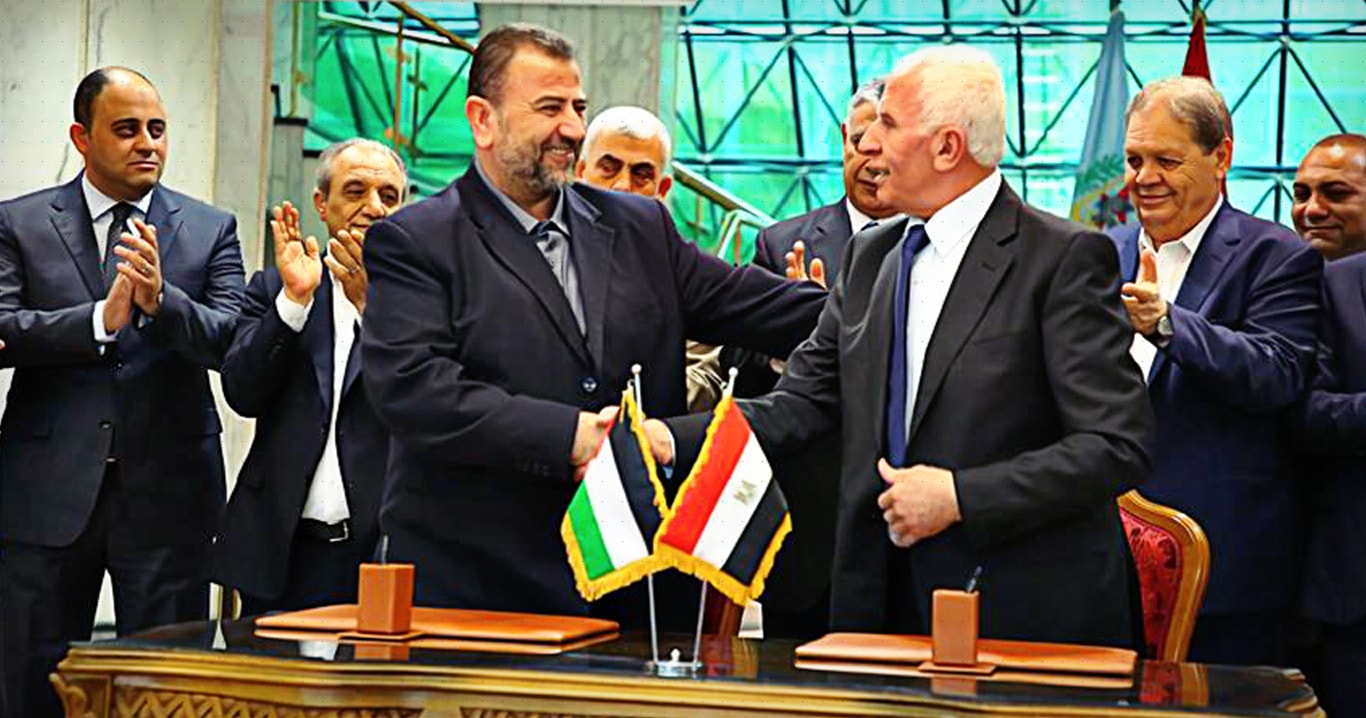
What should be said about Palestinian “reconciliation?”
Much has been written about the recent agreement between the Fatah and Hamas movements under the auspices of Cairo. In fact, it deserves all this, especially in terms of research, analysis and foresight, as an important event with implications for the overall Palestinian scene.
However, many of the writings expressed wishes, dreams and desires more than facts and logic, in the sense that they wrote what the public “likes” to read, not what it “needs” to read. However, a good number of writings and opinions did not give up objectivity in favor of optimism, and they were obviously committed to impartiality.
While the first few hours and days included affirmative and conclusive statements from some Palestinian officials on reconciliation, the delay of the agreement’s output so far should be a sufficient reason for reconsideration of the whole matter.
The first thing to say is that what has happened so far is far from the idea of “reconciliation” between the two largest organizations on the Palestinian arena. It was closer to a “concession” by Hamas from the rule of the Gaza Strip and handing it over to the Palestinian Authority / Fatah. Any other description comes within what we can call it biased analyses that are not based on reality.
It should also be said that the delay in freezing Mahmoud Abbas’s punitive measures against the Gaza Strip – not against Hamas by the way – has ill intentions on this track, suggesting that the man has somehow been forced to accept the agreement that he did not originally want, or that he thinks that Hamas is handing over Gaza ‘rule’ to him out of weakness and crisis caused by his sanctions; and therefore he wants to maintain his pressures to get more concessions.
Accordingly, there is an important thing that people of opinion and writers should say, i.e. that the two parties – Hamas and Fatah – are not equal in this process, in terms of the concessions they offered. The first (Hamas) has presented what it should do and more, and seems very keen to complete the process to the end, (Even some of its leaders issued statement in this regard that exposed them to criticism from their supporters.). On the contrary, Abbas and Fatah do not seem in a hurry – not only on concluding the real reconciliation anticipated by the Palestinian people, but also regarding the lifting of “sanctions” imposed on employees, ill people, and the people of Gaza in general.
Although many observers argue that Hamas is prompted to do this (offering concessions) – regardless of the relevance of this proposition given the fact that this agreement does not significantly differ from previous ones in terms of its content – however, this does not diminish the value of what the movement has presented so far and what it seems determined to offer in the future. At the same time, Mahmoud Abbas (Abu Mazen) is turning a blind eye on the suffering of the Palestinian people in the Gaza Strip; and perhaps this confirms what we have previously said that many problems affecting the Palestinian issue are caused by Abbas’s absence from the political arena.
We should think about the reasons behind Washington’s and Tel Aviv’s lifting of their ”Veto” on the Palestinian reconciliation and agreement between Hamas and Fatah. But I think that the “Veto” was only lifted to allow the handover of power in Gaza to Fatah and keeping Hamas away from the scene. However, a complete approval of the path of reconciliation between the two parties was never provided.
Finally, what are the criteria for the success of this track? When can we say that Palestinian reconciliation has already succeeded? I think that there are two criteria: one for the beginning, and the other for the end.
The starting point for a genuine reconciliation process is the acceleration of lifting all sanctions imposed on the Gaza Strip by Mr. Mahmoud Abbas. He should also order his ministers to assume responsibility and start running the affairs of their ministries effectively. Also, he should visit the Gaza Strip to confirm unity of Palestinian geography under occupation in both Gaza and the West Bank.
The other important determinant for the success of the reconciliation is the crystallization of a national Palestinian project for all Palestinian factions, forces, currents and figures – a project that adopts liberation and depends on resistance in all its forms. This project should also be committed to protecting the constants, safeguarding the Palestinian rights, and confronting the Zionist project.
What has harmed the Palestinian issue so much is the division of political projects that have hindered liberation. What the people have been anticipating and calling for is not the achievement of ‘political quotas’ within the framework of Oslo Accords, nor the provision of food and medicine to the Palestinians (in spite of its significance), nor the gathering of Palestinians on a project other than liberation.
The largest, most prominent, and most dangerous problem of the Palestinians – and the whole region – is the occupation, and as long as this occupation exists, they won’t be able to lead a normal life. And talk about prosperity, happiness, decent living and employment opportunities under the occupation remains mere talk about relative terms that cannot be, by themselves, the major targets of the Palestinian people, factions, and forces.
What the Palestinian people really need is liberation of their land and defeating the Zionist project, and all other targets are merely sub-goals or transitional targets, as long as they serve the ultimate main goal. When the Palestinian forces gather on this main goal and program, we will then be able to talk about a genuine reconciliation that can promote the liberation project, not anything else. (1 )
————————
References
(1 ) The views expressed in this article are entirely those of the author’s and do not necessarily reflect the views of EIPSS.